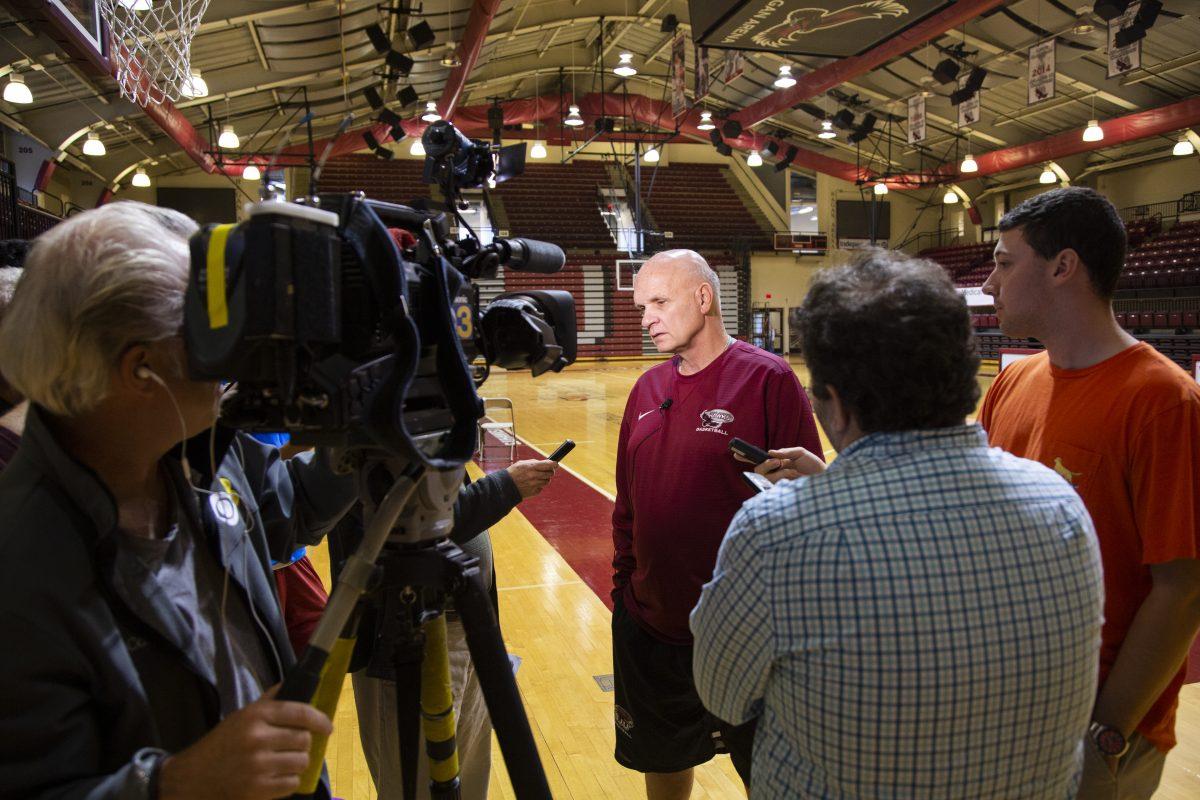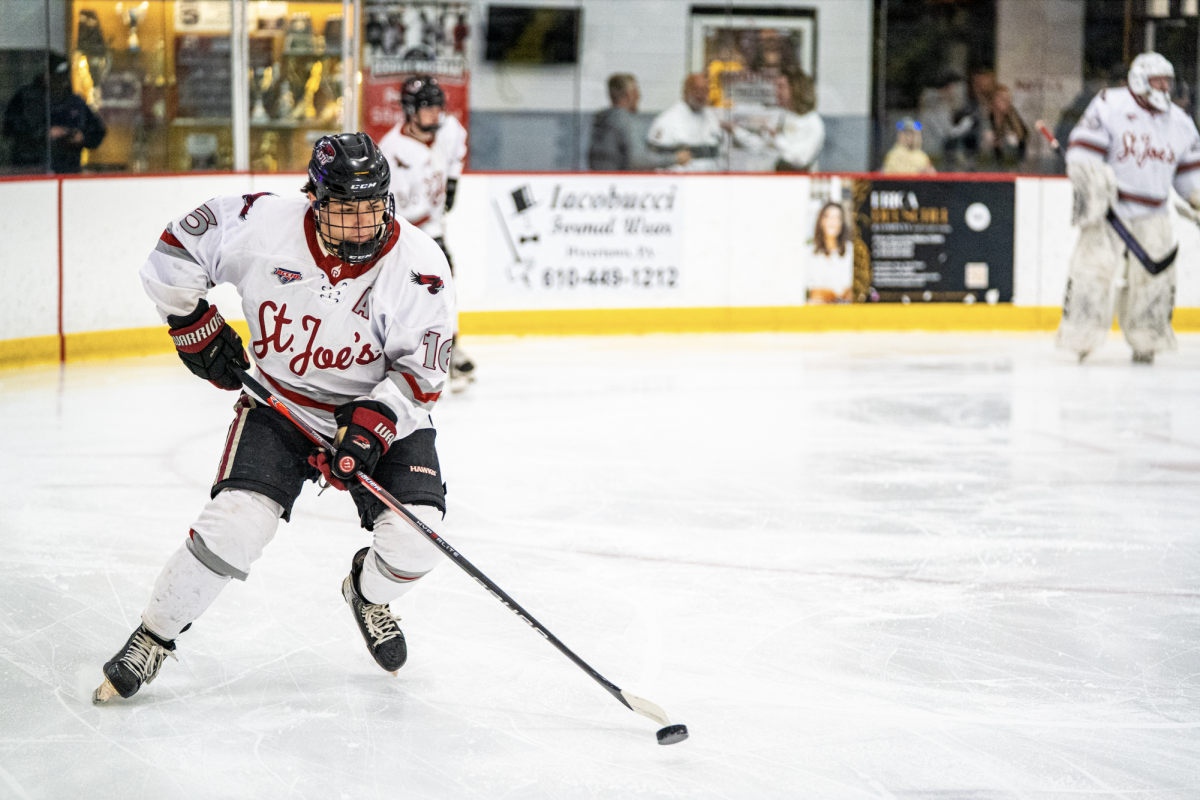Nick Mandarano ’18, former sports editor for The Hawk, began his journey as a journalist with a sports podcast that he hosted his first year of high school in 2010. Mandarano decided he needed a prominent guest on his show and emailed Phil Martelli.
While Mandarano succeeded in securing the interview for his show, he failed to ask what number Martelli would be calling him from.
“We didn’t have call screening at the time, so I was sitting there waiting for Martelli to call in,” Mandarano remembered. “I realized there was a number on the line, but I didn’t want to put them on if Martelli was about to call in, so I emailed St. Joe’s all frantic, ‘What’s his number? What’s his number?’”
Mandarano didn’t hear back from the university, and he left Martelli on hold for the entire 30-minute show.
“After the show, I logged off, and I was like, ‘Not sure what happened with Martelli. Maybe we’ll try to get him next week,’” Mandarano said. “He called me after the show. He was annoyed. ‘You know, Nick, I was on hold for 30 minutes,’ and I was like, ‘I’m so sorry.’ Before we ended that three-minute phone call, he told me how great of a job I did. He told me to keep working, and he said he’d be on the next episode.”
Mandarano said that incident is reflective of how Martelli handled the media, interviews—and students.
“I was a 15-year-old kid,” Mandarano said. “He was doing me a favor, and I kind of screwed him over and wasted his time. But because he was so, one, respectful to the media and two, cared about helping people out and helping kids out, he without question was ready to come on the next show.”
In his 24 years as head coach of the St. Joe’s men’s basketball team, Martelli built a reputation for helping out student journalists, including dozens of sports writers and editors for The Hawk.
Matthew De George ’10, a former sports editor for The Hawk, said he once approached Martelli to write about why so many players were transferring.
“We had this long conversation, some of it on the record, some of it as background about what was going on with the program,” De George remembered. “The way that Phil communicated with me was something other than as a college junior who didn’t really know what he was doing. He communicated with a level of respect, and I walked out of there with a more nuanced understanding.”
Garrett Miley ’15, M.A. ’19, another former sports editor for The Hawk, said Martelli both showed and expected respect from the student journalists he worked with at St. Joe’s.
In April 2013, Miley ran a story about a scandal surrounding the men’s basketball coaching staff at Rutgers University that involved Martelli’s son, Jimmy Martelli. The Hawk’s story stated that Jimmy Martelli had previously been on the St. Joe’s men’s basketball staff, but Martelli emailed Miley to correct him. Jimmy Martelli ran summer camps at St. Joe’s, but he was never officially part of the coaching staff.
“He just wanted to have a conversation about it and understand how that information got there and how to correct it, which I thought was fair,” Miley said.
Sean Woods ’09, former sports editor for The Hawk, said Martelli treated student journalists the same way he treated professionals.
“When I was the beat writer for the basketball team, he was always accessible,” Woods said. “He always treated the beat writers as if they were any other professional writer covering the team.”
But Woods said Martelli did not coddle student journalists.
“If he was mad because of a loss or something like that, he would be just as gruff with us as with any of the [other] reporters asking questions,” Woods said.
Sports editors have also been able to build a relationship with Martelli through open practices and Martelli’s accessibility for interviews.
Miley said the opportunity to attend open practices with the team offered an opportunity few student journalists get to experience. It is rare for Division I teams to host open practices.
“Seeing a coach during practice is different from during a game,” Miley said. “You get to see the most out of them that way, so I think that was one of the really cool things that he did that not a lot of other coaches allowed. That’s a pretty big level of trust.”
In an interview following his firing, Martelli told The Hawk these open practices served multiple purposes. He wanted to invite the St. Joe’s community to see the team’s enthusiasm. Plus, he didn’t see the need to practice in a “sterile environment.” Instead, he wanted to simulate the distractions of game day.
“That basketball court is my classroom,” Martelli said. “I want you to see my teaching.”
Martelli’s classroom is where Mandarano said he found his ability to do the most accurate reporting on the team.
“That allows you to ask more fair questions,” Mandarano said. “It allows you to report more fairly. You’re able to see his relationship with players and get a more in-depth look as to what exactly is going on with the team, how they interact, how they’re preparing, rather than just surface value what happened in the game.”
Miley said Martelli’s coaching extended beyond working with just his players.
“He gave athletes a lot with his coaching, but I think he understood what he could give to student journalists in a sense, too—a lot of experience,” Miley said.















































